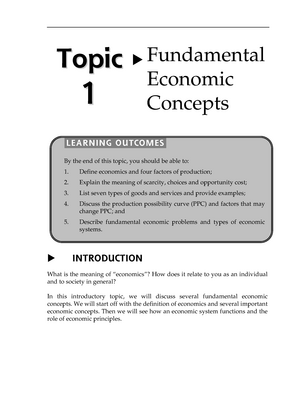- Information
- AI Chat
Was this document helpful?
Chapter 1
Course: Microeconomics
5 Documents
Students shared 5 documents in this course
University: Taylor's University Lakeside Campus
Was this document helpful?

Definition of Economics
oStudy of choices due to problem of scarcity
Basic economic problems
oScarcity
Unlimited wants and needs
Limited resources
Require us to choose.
Opportunity cost: cost of giving up the second-best option
Fundamental question of economics:
What should we produce?
oProduction of a particular good → cannot produce another
good → opportunity cost arises
How should we produce it?
For whom should we produce it?
oDistribution of goods
Factors of production (FOP) / resources
oLand
Natural resources
oLabour
Human workers / all human efforts used in production
oCapital
Physical
Capital – all physical assets used by human for production
Human Capital – Knowledge and skills obtained by labours
oEntrepreneurship
Combine other 3 FOPs for production
Take risk
Market
oBuyers and sellers of a particular good or service interact
3 Key Economic Ideas:
oPeople are rational
Use all information to make best possible decisions to max benefits
oPeople react to economic incentive
People will react to benefits / costs / changes. Eg. If price increases →
people buy less
oOptimal decisions are made at the margins
Most decisions involve reaction to change
When there are changes, best decisions can be made by comparing change
in benefit (marginal benefit) and change in cost (marginal cost)
Economic systems
oWho should own the resources?
Centrally planned / command economy (govt owns all the resources directly
or indirectly)
Free market / laissez faire / capitalism (private markets own all the
resources)
Mixed economy (resources owned by govt and private markets)
Students also viewed
- Jazaria - Umbak Properties just paid a dividend of $2.53 per share on its stock. The dividends
- Orange Green Blue Colorful 5 Reasons To Use Informational infographic
- Split Doc 503 - Summary Guyton e Hall - Fisiologia medica 13 ed.
- Split Doc 492 - Summary Tratado de fisiologia Medica
- Split Doc 493 - Summary John D. Rockefeller - The Original Titan
- 2022 Tompkins Cambridge University Rankings









